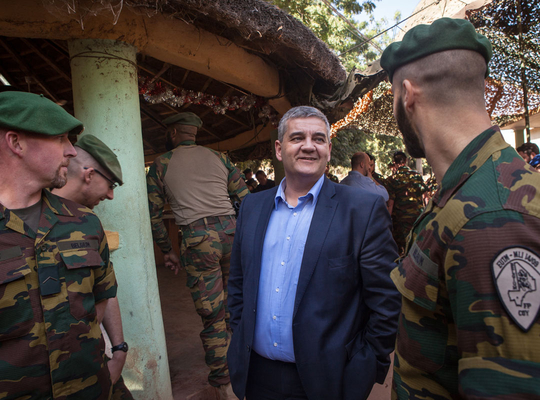You are here
Reinvesting in Defence

Minister of Defence Steven Vandeput has not taken lightly his job of drawing up a strategic action plan for the army, which has meanwhile also been approved by the government. “I have always said that I prefer to have a good plan that has taken some time, rather than an inferior plan that has been drawn up in a hurry,” he comments. “This government is going to reinvest,” he says in summarising the essence of his plan. He seeks to increase the defence budget from 0.9 to 1.3 percent of the Gross Domestic Product, i.e. from EUR 4 to 6.5 billion, by 2030, the memorandum’s investment horizon. “The approved plan allows for modernising Defence, rationalising it and making it ready for future security challenges,” Steven Vandeput explains.
Minister Vandeput was able to announce the strengths of his strategic action plan at the end of last year. “We are evolving towards an army of 25,000 people,” he repeats, “an army that is better equipped, and in the long-term facilitates our ability to continue contributing in the way for which we are internationally recognised.” Clear choices have been made with that objective in mind. “There are a number of tasks that we will no longer carry out,” according to Steven Vandeput. “For example, we have slightly reduced our air defence, and we will also stop investing in very heavy ground equipment. On the other hand, we have opted to retain five motorised battalions in our ground forces: the same number as today, but fully equipped, so that our ground forces can effectively carry out their tasks as safely as possible. If you take the time to read the entire document, you will probably have to concede that drawing up an even more balanced plan would be no easy feat. Attention is currently focused on replacing the F-16s, but we are still spending a third of the budget on the navy and a third on ground forces.”
Respecting international solidarity
This strategic Defence vision means our country can demonstrate how seriously it takes international solidarity at the NATO summit in Warsaw. Acutely aware of the situation, Steven Vandeput states, “We must do our part to contribute to international security.” “In the past, we have always been able to depend on international partners when it came to our security. However, they also expect us to contribute when the need arises. Today we are still able to provide that contribution. But if we fail to reinvest, and don’t replace our equipment, or fail to take note of a number of new activities imperative for Defence, such as cyber-related issues, we risk falling grossly short in the future.”
The new investments trail nearly a quarter century behind cuts in Defence Spending. “After the end of the Cold War, not only Belgium, but all of Europe started disinvesting in Defence,” Steven Vandeput remarks. “But we have taken it too far,” he says, referring to the policies of previous governments. “That’s why, upon its taking office, that the present government stipulated in the coalition agreement that we must provide Defence with the resources it needs to properly carry out its tasks.” Thus, this government makes a clear break with past policy. At the same time it provides a realistic investment path for the long term, which must also be borne by future governments. “Now is the time for us to shoulder our responsibility; otherwise things could already go completely wrong by 2025,” Steven Vandeput concludes.

